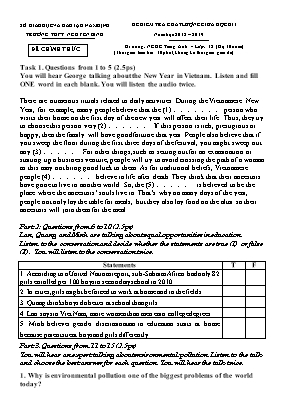Đề kiểm tra chất lượng giữa học kì I kĩ năng nghe Tiếng Anh Lớp: 12 (Hệ 10 năm) - Năm học 2018-2019
Bạn đang xem tài liệu "Đề kiểm tra chất lượng giữa học kì I kĩ năng nghe Tiếng Anh Lớp: 12 (Hệ 10 năm) - Năm học 2018-2019", để tải tài liệu gốc về máy bạn click vào nút DOWNLOAD ở trên

SỞ GIÁO DỤC VÀ ĐÀO TẠO NAM ĐỊNH ĐỀ KIỂM TRA CHẤT LƯỢNG GIỮA HỌC KÌ I TRƯỜNG THPT NGUYỄN BÍNH Năm học 2018 – 2019 ĐỀ CHÍNH THỨC Kĩ năng: NGHE Tiếng Anh - Lớp: 12 (Hệ 10 năm) (Thời gian làm bài: 30 phút, không kể thời gian giao đề) Task 1. Questions from 1 to 5 (2.5ps) You will hear George talking about the New Year in Vietnam. Listen and fill ONE word in each blank. You will listen the audio twice. There are numerous rituals related to daily activities. During the Vietnamese New Year, for example, many people believe that the (1) person who visits their home on the first day of the new year will affect their life. Thus, they try to choose this person very (2). If this person is rich, prestigious or happy, then the family will have good fortune that year. People also believe that if you sweep the floor during the first three days of the festival, you might sweep out any (3).. For other things, such as setting out for an examination or starting up a business venture, people will try to avoid crossing the path of a woman as this may not bring good luck to them. As for traditional beliefs, Vietnamese people (4) believe in life after death. They think that their ancestors have gone to live in another world. So, the (5).. is believed to be the place where the ancestors’ souls live in. That’s why on many days of the year, people not only lay the table for meals, but they also lay food on the altar so their ancestors will join them for the meal. Part 2: Questions from 6 to 10 (2.5ps) Lan, Quang and Minh are talking about equal opportunities in education. Listen to the conversation and decide whether the statements are true (T) or false (F). You will listen to the conversation twice. Statements T F 1. According to a United Nations report, sub-Saharan Africa had only 82 girls enrolled per 100 boys in secondary school in 2010. 2. In cities, girls might be forced to work at home and in the fields. 3. Quang thinks boys do better at school than grils. 4. Lan says in Viet Nam, more women than men earn college degrees. 5. Minh believes gender discrimination in education starts at home because parents treat boys and girls differently. Part 3. Questions from 11 to 15 (2.5ps) You will hear an expert talking about environmental pollution. Listen to the talk and choose the best answer for each question. You will hear the talk twice. 1. Why is environmental pollution one of the biggest problems of the world today? A. Because it brings people a lot of benefits. B. Because it brings about contamination, ecosystem, and the cause of some diseases. C. Because people like it. D. Because it brings us happiness. 2. Which contributes to the greenhouse effect? A. air pollution B. soil pollution C. water pollution D. noise pollution 3. Which causes soil pollution? A. raining B. fossil fuels C. fertilizers D. water 4. The effects of water pollution include. A. destruction of ecosystem of rivers B. lakes and the pollution of groundwater C. surface water and seawater D. All of them 5. Stress and psychological and health problems are caused by.. A. loud and annoying sounds B. Lyrical songs C. Arousing songs D. Vehicals Part 4. Questions from 16 to 20 (2.5ps) There are five short conversations in this part. Each conversation has three pictures. You will hear each conversation and choose the best pictures of three. You will hear each conversations twice. 1. What will James do after dinner? A B C 2. Where are the couple? A B C 3. Which room has the woman cleaned? A B C 4. What will the two people buy? A B C 5. What does the woman suggest? A B C THE END
Tài liệu đính kèm:
 de_kiem_tra_chat_luong_giua_hoc_ki_i_ki_nang_nghe_tieng_anh.doc
de_kiem_tra_chat_luong_giua_hoc_ki_i_ki_nang_nghe_tieng_anh.doc dap an de nghe 12a1 8t HK1 (18-19).doc
dap an de nghe 12a1 8t HK1 (18-19).doc File nghe cua bai kiem tra.wav
File nghe cua bai kiem tra.wav





